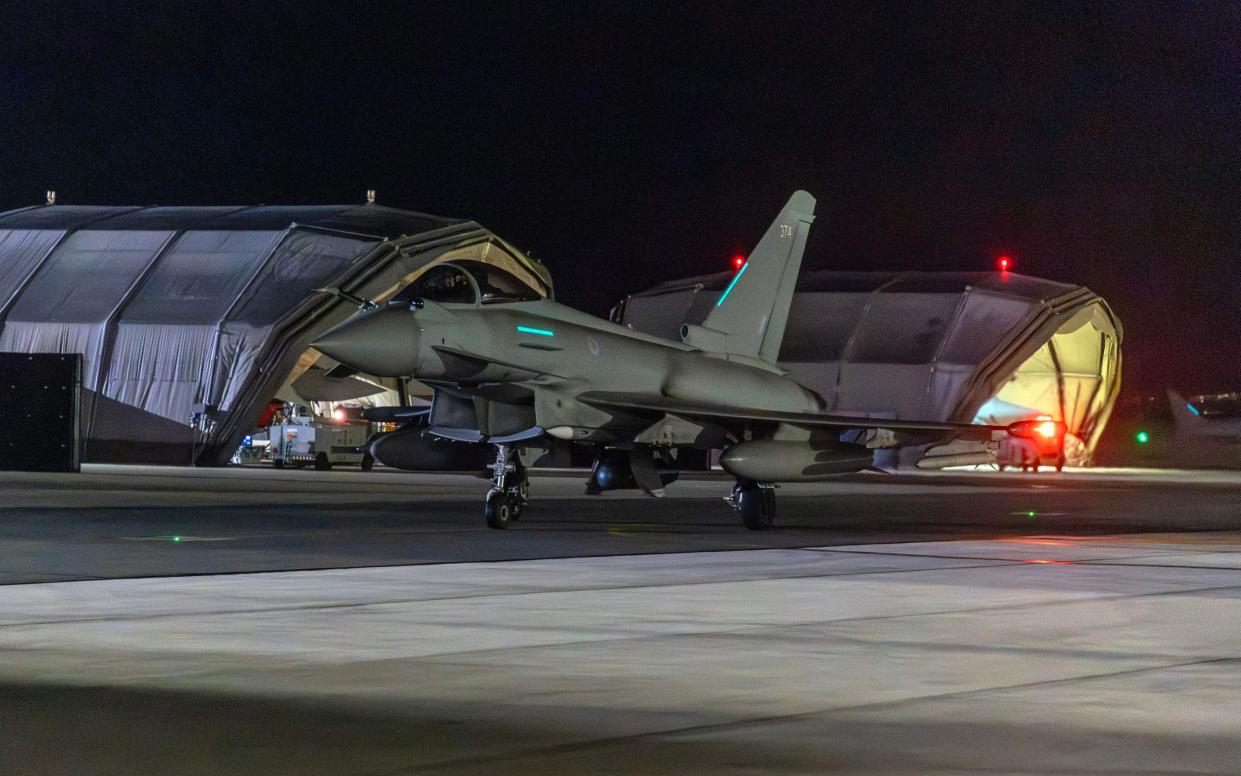Britain and America must be ready to bomb Houthi bases to rubble

- Oops!Something went wrong.Please try again later.
- Oops!Something went wrong.Please try again later.
Precision guided attacks by US and UK forces are designed to cut the head off the Houthi snake before it has a chance to set the Middle East on fire and hold global trade to ransom. The terrorists on the Arabian Peninsula, fuelled and fed by Iran, are under orders to bring the West into another disastrous conflict to strangle their economies and create global derision. Western action overnight is designed to prevent this and shows that, at last, we appear to have learned from our disastrous handling of the conflict in Syria in 2013; a conflict which showed us up as weak and indecisive, with disastrous ramifications.
I was in Syria in the summer of 2013 when President Obama threatened to respond if the Syrian dictator Bashir Al-Assad dared to use chemical weapons. When Assad did just that, killing 1500 civilians in Ghouta near Damascus, he did nothing.
That response had been partly shaped by the British Parliament: I was also there in September 2013 when the House of Commons debated whether to hit the Syrian chemical weapons facilities with precision strikes to stop the genocide. Unfortunately, prime minister David Cameron gave a pretty limp speech in favour, and Labour’s Ed Miliband used the issue as an opportunity to divide and wound the government. Presumably unwilling or unable to understand the magnitude of the decision, he switched Labour’s votes, and thus Parliament – helped by several rebellious Tories – let Assad off the hook.
For the next five years Assad continued to kill thousands of civilians and used chemical weapons over 100 times. I started collecting evidence of those chemical attacks myself, but it took the French government until November 2023 to issue an arrest warrant to Assad. Then in April 2018 Assad attacked the town of Khan Shaykhun again with a nerve agent, killing many civilians.
This time – at last – we struck Assad chemical weapons facilities with precision guided attacks and pretty much stopped the use of these illegal weapons. Whilst a year later the Damascus suburb of Douma was again hit with chemical weapons, but this time with chlorine. It killed over 70 people, mostly children. That night I had a call from somebody very senior in the government asking me if we would be doing the right thing if we struck the Syrian chemical facilities again. I could confirm we were.
The Douma chemical attack proved to be the last in Syria. Striking after Kan Sheikun stopped Assad using chemical warfare agents, and striking after Douma stopped him using chlorine. But, in a sense, the damage had already been done. Using chemical weapons in August 2013 kept Assad in power at a critical moment.
I pray politicians have learnt the lesson from that terrible saga: that you must not appease terrorists and tyrants, for unpunished evil grows.
The MOD appears to believe this is an isolated strike on Yemen. But if not, we must be prepared to repeat such strikes until the threat is gone. Iran holds the key to escalation in the region and no doubt the US and UK alliance will be “encouraging” Tehran to desist.
China is being tellingly silent at the moment. Since it is their goods and services most impacted by strikes in the Red Sea, it is disappointing that – once again – it is Britain and the US who have had to do the right thing. When the second most powerful military on the planet does nothing, it tells you something about their mentality.
As the maelstrom of political and media debate rages today and over the weekend, I hope those in Westminster put the security of this country first. The only thing that tyrants and terrorists understand is the equal and opposite threat of violence to curb their terror, and if this is absent, they will only continue and increase their attacks.

